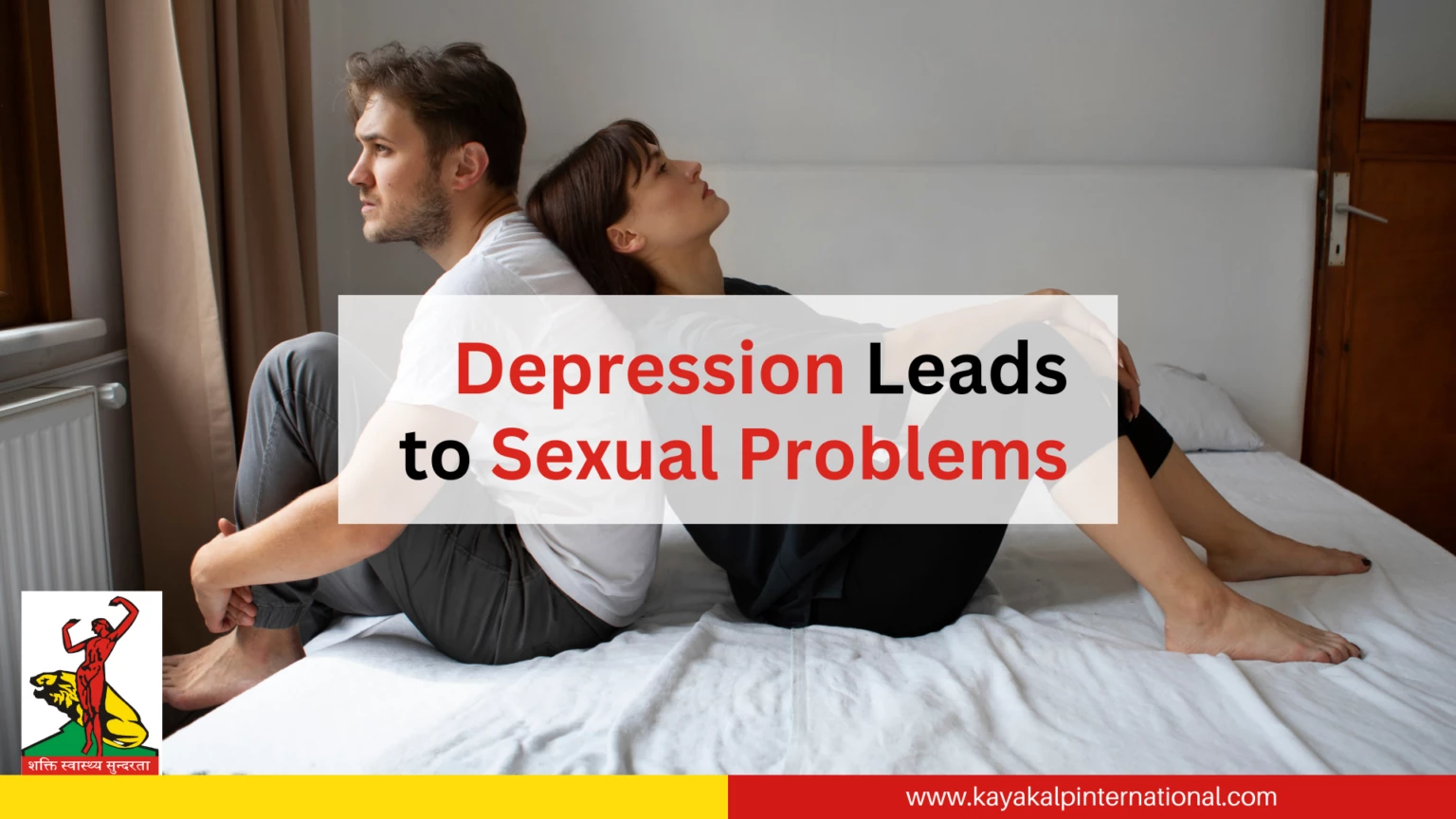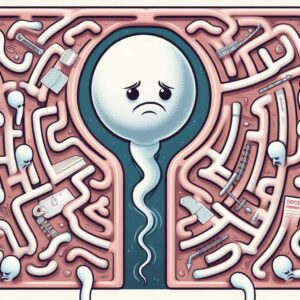Depression, classified as a mood disorder, induces persistent sadness and a loss of interest. Commonly referred to as major depressive disorder or clinical depression, it impacts your emotions, thoughts, and actions, potentially leading to various emotional and physical challenges. Sexual dysfunction emerges as a prevalent symptom of depression. While reduced libido is frequently reported, issues with arousal leading to vaginal dryness in women and erectile dysfunction in men, and absent or delayed orgasm, are also widespread.
Sexual dysfunction further arises as a frequent undesirable consequence of treatment involving most antidepressants, often a primary reason for prematurely discontinuing the medication. Notably, selective serotonin reuptake inhibitors (SSRIs), which constitute the most commonly prescribed antidepressants, significantly affect both arousal and orgasm, diverging from antidepressants that target norepinephrine, dopamine, and melatonin systems.
Common Causes of Depression:
Chemical imbalances within the brain can trigger depression. These imbalances may stem from genetic predispositions or hormonal fluctuations. Additionally, depression can coincide with other medical conditions. Irrespective of its origin, depression can give rise to various physical and emotional symptoms.
Some of the most common symptoms of depression include:
continual feelings of sadness, diminished enthusiasm for previously enjoyed activities, feelings of guilt and hopelessness, trouble sleeping and persistent fatigue, irritability and heightened anxiety, physical weakness, discomfort, and pain, sexual dysfunction, trouble concentrating, fluctuations in weight (often due to alterations in eating patterns), inclination towards suicidal thoughts
- continual feelings of sadness
- diminished enthusiasm for previously enjoyed activities
- feelings of guilt and hopelessness
- trouble sleeping and persistent fatigue
- irritability and heightened anxiety
- physical weakness, discomfort, and pain
- sexual dysfunction
- trouble concentrating fluctuations in weight (often due to alterations in eating patterns)
- inclination towards suicidal thoughts
How Depression is One of the Major Causes of Sexual Dysfunction
Depression impacts sexual experiences due to biological factors. This process originates with neurotransmitters, chemicals within the brain responsible for communication. They establish a connection between the brain, where sexual desire originates, and the sexual organs. When the desire is triggered in the brain, blood flow to the sexual organs increases. This heightened blood flow leads to arousal, resulting in erections or vaginal lubrication.
In individuals grappling with depression, these neurotransmitters become imbalanced. As a result, sexual desire may diminish or even disappear. Moreover, an imbalance in these chemicals can dampen pleasurable sensations. The strain that depression introduces into relationships can further impede sexual function and enjoyment.
Approximately 40 per cent of individuals dealing with depression encounter some
form of sexual difficulties. The extent of these challenges is influenced by the severity of the depression and additional coexisting conditions like anxiety. Among those with more intense depression, around two-thirds experience sexual problems.
Sexual Challenges May Follow Specific Symptoms of Depression:
- Inability to experience pleasure
- Loss of interest in activities
- Low energy levels
- Mood swings
- Reduced self-esteem
How Anti-depression Medication Can Lead to Sexual Dysfunction:
Antidepressants, known as medications used to alleviate depression, prove highly effective in easing its symptoms. However, many of these medications are accompanied by sexual side effects. A prime example is selective serotonin reuptake inhibitors (SSRIs).
SSRIs elevate serotonin levels, a neurotransmitter in the brain that can enhance mood. Yet, this heightened serotonin level can disrupt normal communication between the brain and the sexual organs. As a result, SSRIs might hinder a man’s ability to achieve an erection or ejaculate. Similarly, these drugs could impede a woman’s capacity to experience orgasm.
Both men and women might encounter difficulties initiating, fully participating in, or deriving enjoyment from sexual activity due to these effects. This scenario can lead to a detrimental cycle where self-esteem is eroded, undermining efforts towards recovering from depression.
While these medications restore a proper equilibrium of brain chemicals, facilitating improved communication among brain cells and mitigating depressive symptoms, the unfortunate consequence is the emergence of sexual issues due to alterations in this chemical balance.
Symptoms of Sexual Dysfunction Caused by Depression:
- Decreased libido
- Difficulties with arousal
- Vaginal dryness
- Erectile dysfunction
- Delayed orgasm
Diagnosis of Depression-induced Sexual Dysfunction:
If you suspect that your sexual challenges are linked to depression, you should have a conversation with your healthcare provider. Sometimes, sexual problems might lead to depression rather than the other way around. Your healthcare provider will consider your medical history and social context and conduct a mental health assessment. Additionally, your doctor will perform medical examinations, including evaluations of gynecologic conditions in women, hormone imbalances, nutritional deficiencies, thyroid disease, urologic conditions in men, and more.
Management of Sexual Dysfunction Associated With Depression:
While depression and its treatment can result in sexual dysfunction as an adverse consequence, the advantages of addressing depression surpass these undesired outcomes. Many individuals tend to attribute their sexual issues solely to using antidepressants in treating depression. Although this connection is valid, it’s important to recognize that antidepressants alone are not the exclusive source. Both preexisting depression and the utilization of antidepressants collectively contribute to diminished sexual interest and difficulties related to sexual function.
Antidepressants affect everyone differently, so finding the right medicine and dosage is important. Always consult your healthcare provider before:
- Adjusting the dose of an antidepressant
- Changing antidepressants
- Stopping antidepressants
- When a decrease in libido emerges or intensifies after a patient commences antidepressant medication, it’s imperative to address this issue while ensuring the ongoing treatment of depression remains uncompromised. Neglecting to address the sexual concern may lead to challenges with adhering to the treatment plan.
- Self-Help Tips for Overcoming Depression-Related Sexual
- Dysfunction: Engage in open conversations with your partner.
- Most issues can be resolved through heartfelt discussions. While meeting your partner’s expectations might pose challenges, don’t fear potential judgment and allow yourself to be candid. Even if you can’t fulfil every expectation, liberate yourself from feelings of guilt.
- Consult your physician and consider taking medications to enhance sexual function if necessary (for men).
- Incorporate regular exercise into your routine. Join groups of like-minded individuals to motivate each other to stay active.
- If you’re taking antidepressants and noticing a decline in sexual function, reach out to your physician to discuss potential adjustments in dosage or medication.
- Minimize or avoid substances like drugs, alcohol, and tobacco, which can influence sexual function.
- Prioritize your overall health by exercising, maintaining a balanced diet, and managing a healthy weight.
- Initiate honest and open dialogues with your partner, addressing your emotional and physical experiences.
Conclusion:
Research findings indicate that sexual issues related to depression are primarily linked to the presence of depression itself rather than being primarily caused by the treatment. In cases where treating depression doesn’t lead to an improvement in libido, it’s recommended to explore other potential causes of sexual dysfunction, such as hormone deficiencies, chronic illnesses, substance abuse, or other medications.
Substantial evidence supports various treatment options for individuals experiencing sexual dysfunction or reduced libido due to antidepressant use. These options encompass reducing the dosage of selective serotonin reuptake inhibitors (SSRIs) or tricyclic antidepressants, considering medication adjustments like adding or transitioning to bupropion and employing nefazodone as an alternative therapeutic approach.
Maintaining your physical and mental well-being is interconnected. If you’re encountering depression, it’s beneficial to foster open communication with your sexual partner, friends, and family members. A robust support network is crucial in any mental health treatment strategy.
Call on 9004393978 or fill in the below form to book an appointment with our specialists.




